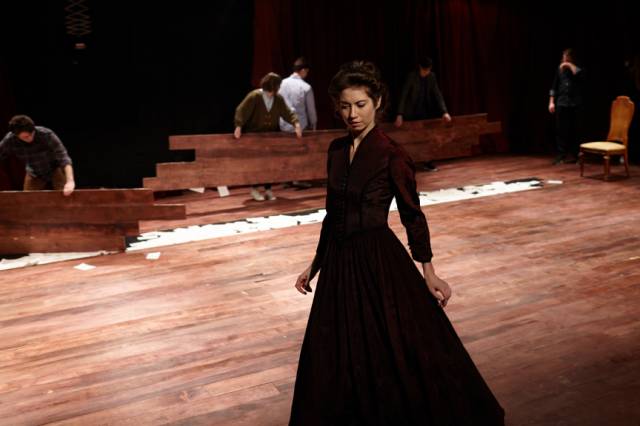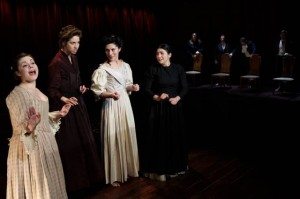

Little Women. Pride and Prejudice. Wuthering Heights. Jane Eyre. These are arguably the most iconic examples of 19th century literature written by women. They have endured for two hundred years with their strong characters, vivid settings, and insightful explorations of the treacherous waters of love and courtship.
You on the Moors Now, a new play by Jaclyn Backhaus presented by the Theatre Reconstruction Company, brings together Jo March from Little Women (played by Lauren Swan-Potras), Lizzie from Pride and Prejudice (Kelly Rogers), Cathy from Wuthering Heights (Anastasia Olowin), and Jane from Jane Eyre (Sam Corbin). Early on in the play, the four of them discuss how they have been proposed to by unsuitable suitors. These suitors, respectively, are Laurie (Nathaniel Basch-Gould), Mr. Darcy (Preston Martin), Heathcliff (Harlan Alford), and Mr. Rochester (Jon Riddleberger). Not wanting to live their lives by society’s rules, the women run off, camp out on the moors, and live life on their own terms. Their beaus, displeased with the decision of the women, run off to find them. This results in a war between the sexes.
The play starts out as a hilarious revisionist look at these stories. The movement and gesticulations are exaggeratedly stilted, lampooning the time period’s strict attention to manners. The four leading ladies and their beaus are dressed in period garb sans shoes (the gorgeous costumes were designed by Joseph Wolfslau). The rest of the ensemble, portraying supporting characters from the novels, are dressed in contemporary clothes. This leads one to expect a portrayal of how contemporary society reacts to the idealized vision of love in these stories, but instead the ensemble plays an assortment of supporting characters from the novels.
The parodic effect, however, begins to wear off after a little while. It eventually becomes clear that the play can’t decide whether it wants to thoroughly explore how love and courtship relate to today, or all-out reimagine the novels in such a manner where the women lead more independent lives and careers. There are many reasons why these women avoid love—fear, independence, pride, and social ranking among them—but the play doesn’t effectively explore these themes and how they relate to the 19th century or the 21st.

The play also feels trapped between the abstract and conventional. It tries to be an intellectual and modernist exploration of the foibles of love and courtship, but at the same time tell a conventional story. There isn’t much reconciliation between the two, and as a result the performance feels muddled. It would have been better served choosing one direction and going all the way with it, rather than the hodgepodge approach that was taken with it. The conclusion features an impressive coup de theatre and pays nice homage to the conclusion of these novels, but it drags on for longer than it needs to.
One is advised to read synopses of all the mentioned novels before seeing this production. While there is plenty of exposition that explains the backstories of these characters, at least a passing familiarity with the stories is required for full appreciation.